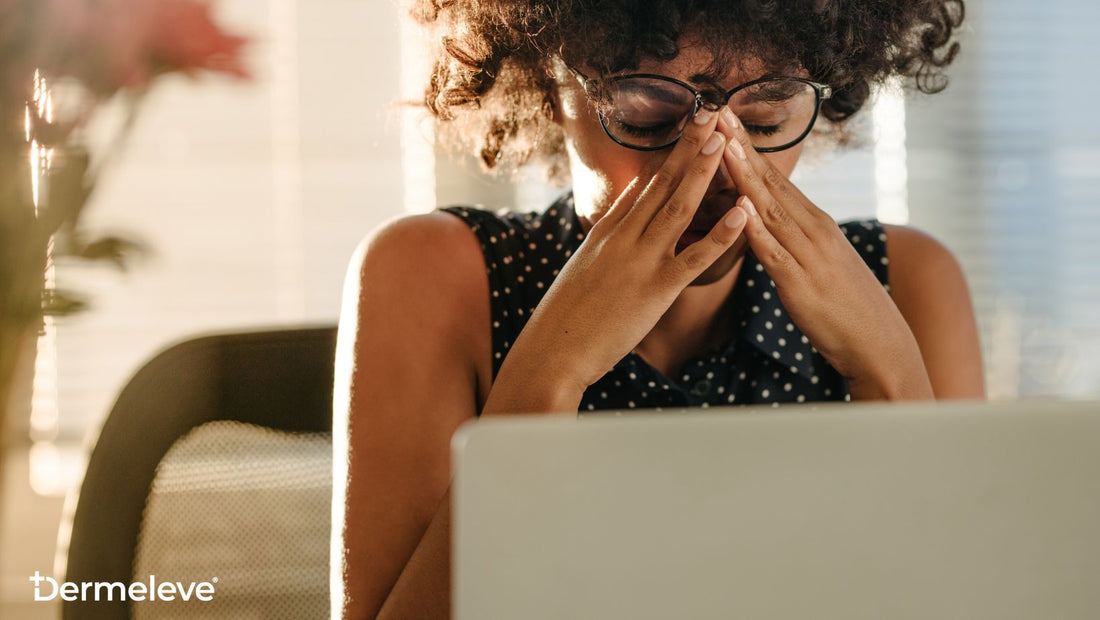If you’ve ever noticed red, itchy patches appearing on your skin during stressful times, you’re not alone. Anxiety and stress don’t just affect the mind—they can also show up on your skin. One of the most common ways this happens is through a stress rash, also known as an anxiety rash or stress hives.
This guide explains what stress rashes are, why they happen, how to tell them apart from other skin conditions, and the best treatment options to find relief.

What Is a Stress Rash?
A stress rash is a skin reaction triggered by prolonged stress or anxiety. It often appears as:
-
Red patches or welts
-
Itchy bumps (hives or urticaria)
-
Localized irritation (commonly on the chest, neck, or face, but it can occur anywhere)
Stress rashes develop when the body’s stress response—specifically the release of cortisol and histamine—triggers inflammation in the skin. Unlike allergic rashes caused by external triggers, stress hives are directly linked to emotional and psychological stress.
Why Does Stress Cause Skin Rashes?
When you feel anxious or overwhelmed, your body goes into “fight-or-flight” mode. This triggers:
-
Hormonal changes – cortisol and adrenaline increase inflammation.
-
Immune system response – histamines are released, which can cause redness, swelling, and itching.
-
Increased sensitivity – stress can worsen existing conditions like eczema, psoriasis, or rosacea.
People with PTSD, OCD, or chronic anxiety disorders may be more prone to developing stress-induced skin reactions. Lifestyle factors like poor sleep, smoking, and alcohol use can also worsen flare-ups.
Types of Stress Rashes
There are generally two categories of stress rashes:
1. Psychogenic Rashes
-
Triggered by intense emotions (fear, anger, sadness).
-
Often accompanied by scratching or rubbing.
-
More common among children and teenagers.
2. Dermatological Rashes
-
Triggered by external irritants or allergens but worsened by stress.
-
Can cause redness, bumps, or even blisters.
-
Typically last longer than psychogenic rashes, sometimes weeks.

Symptoms of Stress Rashes
A stress or anxiety rash can present as:
-
Red, raised welts or hives
-
Itchiness or burning sensation
-
Localized swelling
-
Clusters of bumps that come and go
In most cases, these symptoms appear suddenly during stressful events and fade within a few days. However, chronic stress may lead to recurrent flare-ups.

Stress Rash vs. Other Skin Conditions
It’s easy to confuse a stress rash with allergic reactions or infections. Here’s how to tell them apart:
-
Allergic rash: Often linked to a specific food, medication, or contact allergen.
-
Infection-related rash: Usually accompanied by fever or other systemic symptoms.
-
Stress rash: Appears or worsens during high-stress periods, often without an external allergen.
If your rash is persistent, painful, or spreading, consult a doctor to rule out other causes.
How to Treat Stress Rashes
The good news is that most stress hives go away on their own. But if itching and irritation become overwhelming, here are proven treatment options:
1. Stress Reduction & Relaxation Techniques
Managing anxiety is one of the best ways to prevent and treat stress-related rashes:
-
Practice mindfulness or meditation.
-
Try yoga, tai chi, or light exercise.
-
Get adequate sleep and fresh air.
-
Avoid alcohol and drugs, which can worsen anxiety.
2. Over-the-Counter Remedies
-
Antihistamines (like Benadryl or Claritin) to reduce itching and swelling.
-
Hydrocortisone creams to calm inflammation.
-
Cold compresses to soothe irritated skin.
3. Prescription Medications
-
Oral steroids may be prescribed for severe or persistent rashes.
-
Doctors may recommend stronger topical treatments for chronic cases.
4. Cognitive Behavioral Therapy (CBT)
Since stress rashes are rooted in anxiety, CBT can help identify triggers, manage negative thought patterns, and reduce flare-ups.
5. Advanced Relief: Steroid-Free Creams
Traditional itch creams often contain steroids, which can thin the skin with prolonged use. A modern alternative is Dermeleve®, a dermatologist-developed, steroid-free anti-itch cream formulated with:
-
Ceramides – to strengthen the skin barrier.
-
Hyaluronic acid – to boost hydration.
-
Vitamins C & E – for skin healing.
-
Shea butter – for lasting moisture.
Its patented SrX-38™ formula works rapidly to stop itching at the source, making it an effective option for stress hives and other itch-related conditions.

When to See a Doctor
Seek medical advice if:
-
Your rash lasts more than a week.
-
Hives spread quickly or interfere with breathing.
-
You have frequent or recurring stress rashes.
-
Over-the-counter treatments don’t provide relief.
A dermatologist or mental health professional can help identify triggers, recommend treatments, and guide you toward long-term skin and stress management.
Dermatologists specifically developed Dermeleve® to treat itching more effectively and safely.
The secret to Dermeleve’s® instant itch-stopping power is through the use of the SrX-38™ steroid-free formula. This unique, patented formula was developed specifically to outperform other itch-relief products without the use of steroids.
What’s more, this cream is formulated with the best quality skin healing ingredients available:
- Ceramides: Lipid-rich molecules which retain moisture and promote skin cell regeneration.
- Hyaluronic acid: Promotes cell proliferation and healing.
- Vitamin C&E: Promotes skin health.
- Shea butter: Helps retain moisture.
Dermeleve® is absorbed rapidly into the skin where it instantly and significantly reduces the sensation of itch.
Though more powerful than most prescription-strength itch creams, Dermeleve® is FDA approved and completely safe for daily use- and is available as an OTC without a prescription.
Dermeleve® is available through a physician’s office, or via the Dermeleve® website.
For more information on Dermeleve® or to place an order, visit the Dermeleve® site.
Frequently Asked Questions About Stress Rashes
Can stress and anxiety really cause a rash?
Yes. Stress and anxiety can trigger the release of cortisol and histamines, which may cause inflammation in the skin. This can result in red, itchy welts commonly called stress hives or anxiety rashes.
What does a stress rash look like?
A stress rash usually appears as raised red bumps or patches that are itchy and sometimes swollen. They may cluster in one area (like the chest, neck, or arms) or spread across the body.
How long does a stress rash last?
Most stress rashes clear up on their own within a few hours to a few days. However, chronic stress or ongoing anxiety can cause rashes to reappear more frequently or last longer.
How can I tell if my rash is from stress or something else?
If your rash appears during stressful periods and improves when you relax, it’s likely a stress rash. Allergic rashes are often tied to foods, medications, or environmental triggers, while infection-related rashes may include fever or pain. If you’re unsure, consult a doctor.
What’s the fastest way to get rid of a stress rash?
Quick relief options include:
-
Taking an antihistamine (like Claritin or Benadryl)
-
Applying a cool compress to reduce swelling
-
Using a steroid-free anti-itch cream like Dermeleve®
-
Practicing relaxation techniques to lower stress levels
Can stress make existing skin conditions worse?
Yes. Stress can worsen conditions such as eczema, psoriasis, and rosacea. Managing anxiety is important not only for your mental health but also for keeping these conditions under control.
When should I see a doctor for a stress rash?
You should seek medical attention if your rash:
-
Lasts more than a week
-
Spreads quickly or interferes with breathing
-
Becomes painful or blistered
-
Keeps coming back despite at-home treatments



